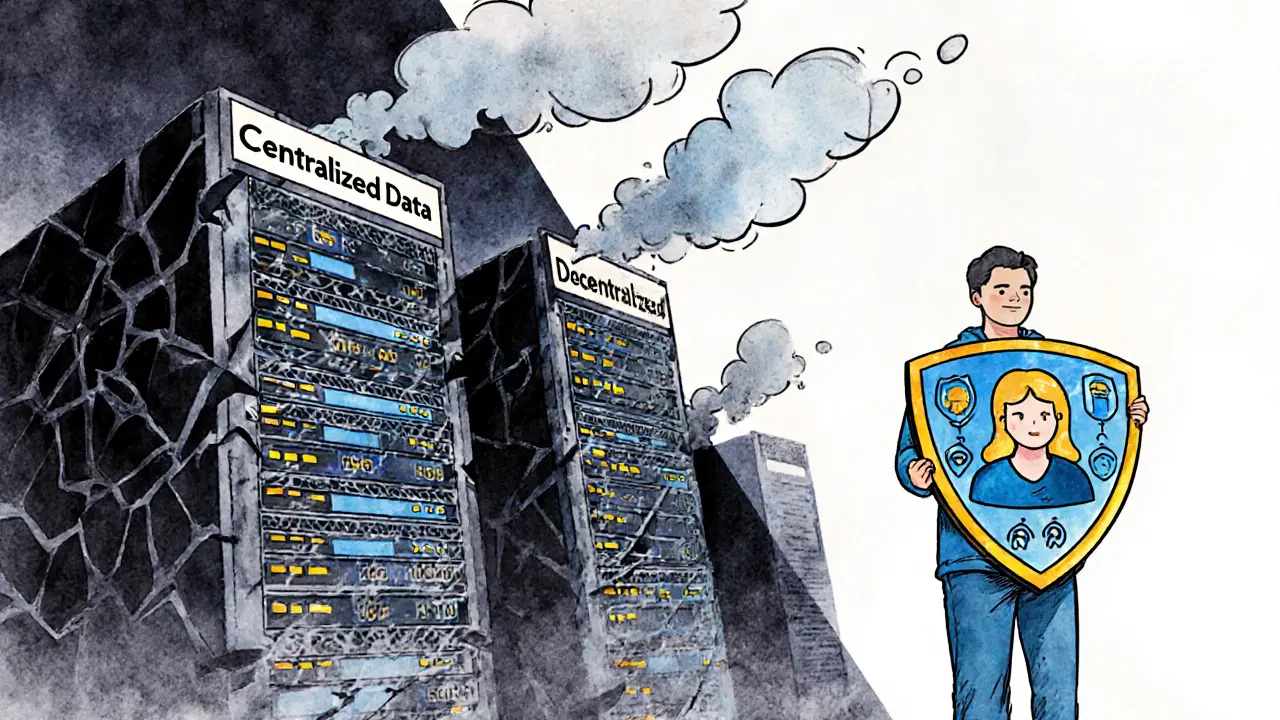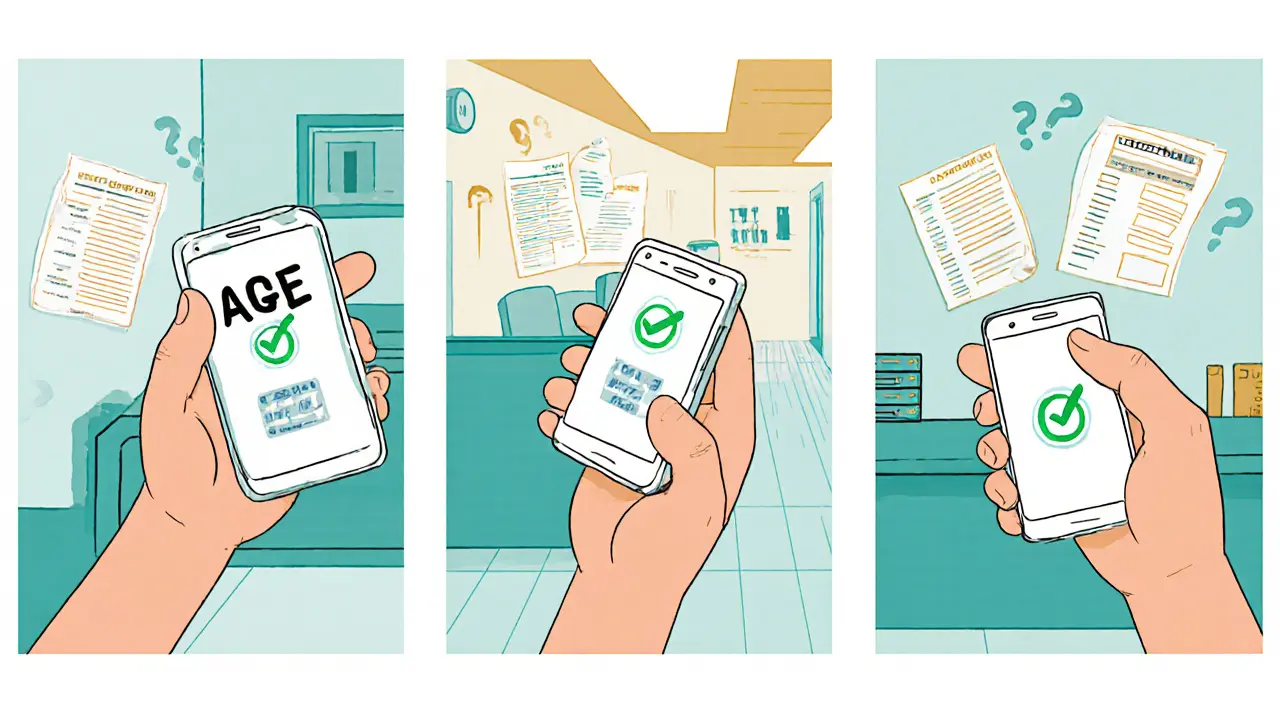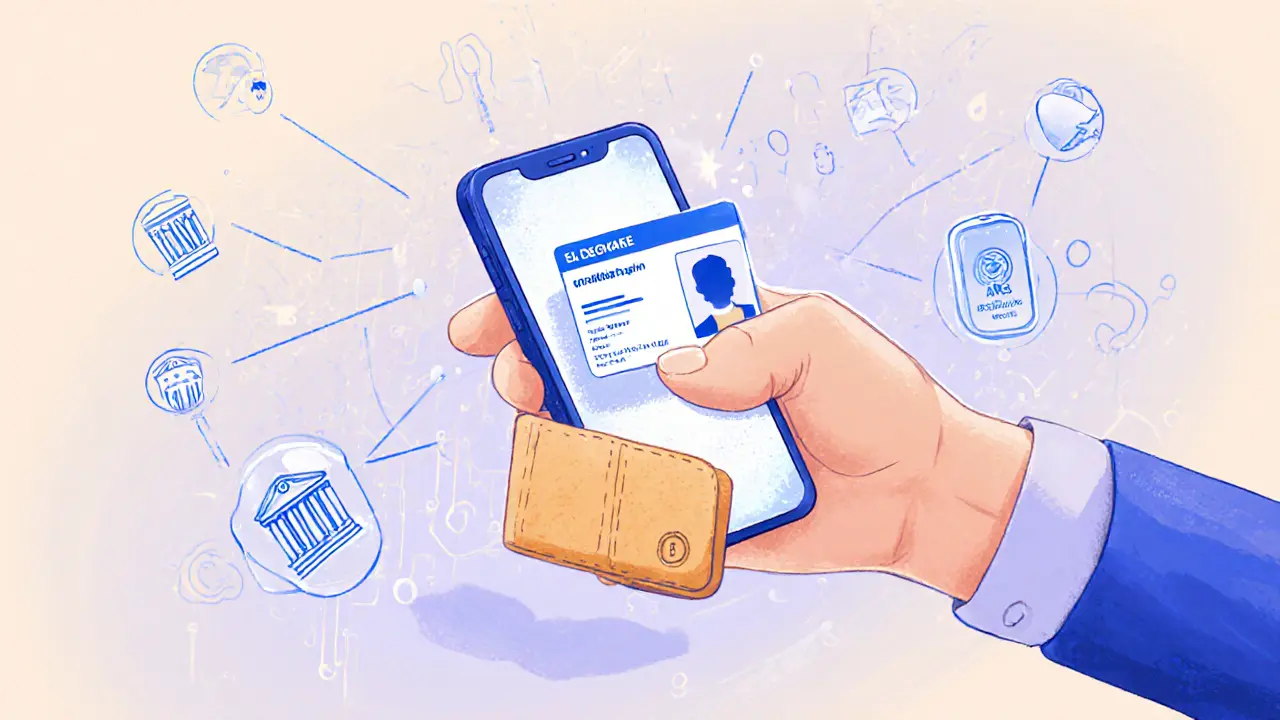Age Verification Calculator
Imagine being able to prove you’re over 18 without showing your birth certificate. Or logging into a bank, a government portal, and a rental platform using the same digital ID-without handing over your passport, driver’s license, or social security number. This isn’t science fiction. It’s what decentralized identity makes possible today.
For years, we’ve trusted companies like Facebook, Google, or Amazon to hold our identities. We give them our name, email, phone number, even our face in some cases. In return, we get access to services. But every time you sign up, you’re adding your data to another database. And every database is a target. In 2024 alone, over 5,000 major data breaches were reported globally. Your identity isn’t just data-it’s your life. And it’s being stored in places you don’t control.
Decentralized identity flips this model. Instead of giving your data to companies, you keep it in your own digital wallet-on your phone, encrypted and under your control. You decide who sees what, when, and why. This isn’t just a tech upgrade. It’s a reset of power in the digital world.
Control Over Your Own Data
Centralized systems make you a product. Your data is collected, sold, and reused without your real consent. Decentralized identity changes that. With self-sovereign identity (SSI), you’re the owner. You store your credentials-like your driver’s license, university degree, or proof of address-in a secure app on your phone. When you need to prove something, you don’t send the whole document. You send a cryptographically signed proof.
For example, if you’re renting an apartment and need to prove income, you don’t upload your pay stubs. You use a verifiable credential from your employer that says, “This person earns over $50,000/year.” The landlord gets proof-but never sees your salary, bank account, or tax ID. This is called data minimization. It’s not just privacy-friendly. It’s legally smarter. Under GDPR and CPRA, companies are fined for collecting more data than necessary. With decentralized identity, they don’t collect it at all.
Security That Doesn’t Break
Remember when Equifax lost 147 million records? Or when Adobe lost 153 million passwords? Those weren’t hacks of individual users. They were hacks of centralized databases. One breach, and millions of identities are exposed.
Decentralized identity removes that single point of failure. Your credentials aren’t stored in a company’s server. They’re encrypted and kept on your device. The blockchain or distributed ledger only stores the public key that verifies your identity-it doesn’t store your name, address, or birth date. Even if a service gets hacked, your data stays safe. No central database means no treasure trove for hackers.
And because each credential is signed with your private key, tampering is impossible. If someone tries to alter your university degree credential, the system instantly rejects it. That’s not guesswork. That’s cryptography.
No More Repeating Yourself
How many times have you filled out the same form-name, address, date of birth-across five different websites? Each time, you risk typos, delays, or worse, giving the same data to a sketchy site.
With decentralized identity, you verify once. Then reuse. Got your driver’s license verified by your government? Use it to sign up for a ride-share app. Got your age verified for a cannabis dispensary? Use it to enter a bar in another country. No new forms. No new uploads. Just tap to share.
This isn’t theoretical. In Estonia, citizens use a national digital ID to access 99% of public services. In Canada, provinces are rolling out verifiable credentials for birth certificates and health cards. In New Zealand, the government is testing SSI for immigration and tax services. The pattern is clear: the future doesn’t ask you to repeat yourself.

Lower Costs for Everyone
Think about how much companies spend on identity verification. Background checks, document scanning, fraud detection teams, customer support calls about lost passwords-all add up. For banks, it can cost $50-$150 per new customer onboarding.
Decentralized identity cuts that cost by 70% or more. Why? Because the user does the verification. The company doesn’t store the data. They just check a cryptographically signed proof. That means less infrastructure, fewer compliance teams, and lower risk of fines for data misuse.
Organizations also save on breach-related costs. The average data breach in 2024 cost $4.45 million. If you’re not storing personal data, you’re not liable for losing it. That’s not just smart. It’s financially essential.
Privacy That Actually Works
Zero-knowledge proofs (ZKPs) are the secret sauce behind true privacy in decentralized identity. They let you prove something is true without revealing the thing itself.
Here’s how it works: You want to buy alcohol. The system asks: “Are you over 21?” Instead of showing your ID, you use a ZKP. The system checks the cryptographic signature on your credential and confirms the date of birth is valid-but never sees the actual date. You prove eligibility. You keep your privacy.
This is huge for sensitive use cases. A survivor of domestic abuse can prove they’re eligible for housing assistance without revealing their past address. A refugee can prove they’ve been vaccinated without exposing their home country or family details. ZKPs turn privacy from a wish into a technical guarantee.

Regulatory Compliance Made Easy
GDPR, CCPA, HIPAA, PIPL-privacy laws are multiplying. Companies are scrambling to comply. Many are terrified of storing personal data because one mistake can mean millions in fines.
Decentralized identity solves this by design. If your company doesn’t store user data, you’re not subject to the same storage, retention, and deletion rules. You’re not a data controller-you’re a verifier. That shifts legal responsibility to the user, who owns the data. It’s a game-changer for fintech, health tech, and government services.
Organizations using SSI report faster audits, lower legal risk, and easier international expansion. Why? Because they’re not violating data sovereignty laws. Your data stays where you are. Not in a server farm in Texas or Ireland.
What’s Holding It Back?
It’s not perfect yet. Some people struggle with managing private keys. Lose your phone? Lose access. That’s why wallet providers now offer recovery phrases and social recovery options-where trusted friends or family help you regain access. It’s not as simple as clicking “Forgot Password,” but it’s safer.
Adoption is still early. Not every website supports verifiable credentials. But that’s changing fast. Microsoft, IBM, and the EU are building open standards. The W3C has standardized DIDs and Verifiable Credentials. This isn’t a startup experiment. It’s infrastructure being built by governments and Fortune 500s.
The biggest barrier isn’t tech. It’s habit. We’ve been trained to trust companies with our identity. Decentralized identity asks us to trust ourselves. That’s the real shift.
The Future Is Yours to Own
By 2030, over 60% of digital identity transactions are expected to use decentralized systems. Why? Because users are tired of being tracked. Governments are tired of managing data breaches. Businesses are tired of paying fines.
Decentralized identity isn’t just about blockchain. It’s about restoring human dignity in the digital age. You don’t need permission to be who you are. You don’t need a corporation to validate your existence. Your identity belongs to you.
The tools are here. The standards are set. The movement is growing. The only question left is: Are you ready to take control?
What is a Decentralized Identifier (DID)?
A Decentralized Identifier (DID) is a unique, resolvable identifier that doesn’t rely on a central registry. It’s stored on a blockchain or distributed ledger and controlled by the user through cryptographic keys. Unlike email addresses or usernames, DIDs are portable, verifiable, and don’t require permission from any company to create or use.
How is decentralized identity different from logging in with Google or Facebook?
When you log in with Google or Facebook, you’re giving that company permission to track you across the web. They know what sites you visit, how long you stay, and often link that to your real identity. With decentralized identity, you own your credentials. No company tracks you. No middleman controls access. You share only what you choose-and nothing more.
Can I still be hacked with decentralized identity?
You can’t be hacked in the traditional sense-because there’s no central database to break into. But if someone steals your phone and your private key, they could impersonate you. That’s why secure digital wallets use biometrics, recovery phrases, and social recovery. It’s like protecting your house: you lock the door, but you still need to keep the key safe.
Do I need to understand blockchain to use decentralized identity?
No. You don’t need to know how blockchain works any more than you need to know how electricity works to use a lightbulb. What you do need is a simple app-a digital wallet-that lets you store and share credentials. Most apps today have buttons like “Share Proof” or “Verify Age.” That’s all you interact with.
Is decentralized identity legal?
Yes. Countries like Japan, Singapore, Canada, and the EU have already recognized verifiable credentials as legally valid for identity verification. The W3C standards are backed by governments and major tech companies. In many cases, decentralized identity meets or exceeds legal requirements for Know Your Customer (KYC) and Anti-Money Laundering (AML) checks.

Bro this is just blockchain hype dressed up like a TED Talk. You think some app on your phone is gonna stop Big Tech from tracking you? Lol. I use Google because it just works. Your 'decentralized wallet' is just another password you'll forget and then cry about it on Reddit.
Dear friends, decentralized identity is not merely a technological advancement, it is a civilizational shift. Imagine, if you will, a world where your data is not a commodity. This is the future. We must embrace it with open hearts and simple minds. :)
Thank you for this beautiful post. Truly inspiring.
Stop acting like this is new. People have been talking about self-sovereign identity since 2016. The only difference now is that venture capitalists are throwing money at it. Blockchain doesn't solve human stupidity. If you lose your key you're screwed. That's it. End of story.
And yes I know what DIDs are. I read the W3C spec. Twice.
Let me guess - this is the same tech the government will use to track you under the guise of 'privacy'.
They’ll say 'your credentials are encrypted' - but what if the verifier is a state agency? What if they log every time you prove your age, your income, your vaccination status? What if this is the first step to a social credit system with better UI?
I’ve seen this movie before. It always ends with someone in a suit smiling while you lose your freedom.
This actually gives me hope. I’ve spent years feeling powerless every time I had to upload my driver’s license to some sketchy website. The idea that I could just tap to prove I’m over 18 without revealing my whole life? That’s the kind of quiet revolution I didn’t know I needed.
This isn’t just about tech - it’s about reclaiming your narrative. For so long, we’ve been reduced to data points in someone else’s algorithm, our identities flattened into ad profiles and credit scores. Decentralized identity? It’s the digital equivalent of finally being able to look someone in the eye and say, ‘This is me - not your database, not your product, not your metric.’
It’s dignity with a private key.
OMG this is literally the future 🤯🔥 I just used my digital ID to book a flight and buy weed in the same app bro. No forms. No waiting. Just vibes. 🌿✈️
Also I got my NFT birth certificate on Polygon. It’s lit. Who needs paper? #SSI #Web3 #DigitalSoul
Let’s deconstruct the epistemological underpinnings of verifiable credentials through the lens of post-structuralist identity theory. The user-as-controller paradigm inherently destabilizes the Foucauldian panopticon of centralized identity infrastructure. By externalizing authentication authority to the sovereign subject, we collapse the heteronomous gaze of institutional verification.
Moreover, zero-knowledge proofs function as a performative act of ontological resistance - the subject proves existence without ontological exposure. This isn’t cryptography. It’s phenomenological liberation.
YES. This is what we’ve been waiting for. Stop letting corporations own your identity. You are not a product. You are not a dataset. You are a person with rights. Start using a digital wallet today - it’s easier than setting up two-factor auth. Your future self will thank you. 💪🌍
you think you’re so smart with your blockchain and stuff but what if you lose your phone? then what? you just become a digital ghost? lol. also why do you think the government won’t just make their own version and force everyone to use it? this is just a trap. i’m not falling for it. 🤡
I get nervous about tech like this, but I love that it puts power back in our hands. I’ve had my identity stolen twice. I don’t want to go through that again. If I can control what gets shared and when… that’s peace of mind. No pressure to be perfect - just choose what to share. That’s all I need.
It’s okay to be scared. Just take one small step. You’ve got this.
Can someone explain how this works with kids? My 12-year-old needs to prove they’re 13 to use a social app. Do they get a credential from their school? How do parents supervise without accessing the data? This part isn’t clear to me.
In India, we’ve been using Aadhaar for years - but it’s centralized, and people get hacked. This? This is what we need. Not more government databases. Not more private companies hoarding our info. Just a wallet. Just control. I’ve shown my degree to three employers using my digital credential. No PDFs. No scans. Just a tap. Magic.
why do i need this? i just want to log in. why is this so complicated? i dont care about blockchain. just let me use my email like normal.
While the conceptual framework is sound, practical adoption remains fraught with interoperability challenges. The absence of universal standardization across jurisdictional frameworks impedes scalability. Furthermore, user experience design in current wallet implementations remains suboptimal for non-technical demographics. Until UX improves and legal recognition becomes globally harmonized, this remains an elegant solution in search of a mass-market problem.
One must pause and reflect upon the ontological implications of relinquishing institutional authority over identity. The shift from state-sanctioned identification to algorithmic self-certification constitutes a radical redefinition of personhood in the digital epoch. One wonders whether this liberation, however technologically elegant, inadvertently erodes the social contract that once bound citizen to state - and whether, in our zeal for autonomy, we have dismantled the very scaffolding that once protected us.
I’ve been testing this with a few apps. The UX is still clunky. Some wallets crash on Android. Others require you to scan your face three times. And don’t get me started on the recovery process - it’s like trying to reset your password while wearing oven mitts. But the concept? It’s revolutionary. I’ve stopped uploading my passport to Airbnb. I use a verifiable credential from my city’s digital ID portal. The landlord never sees my name, address, or birthdate - just a signed proof that I’m not a robot. It’s weirdly empowering. And yeah, I’m still learning. But I’m not going back.
THIS IS THE FUTURE 🚀🔥 I just proved I’m over 21 to a bar in Berlin using my phone. No ID. No questions. Just a tap. And I didn’t even need to open my wallet - the app did it in the background. This is what Web3 feels like. Real. Instant. Human. 💯 #DecentralizedIdentity #NoMoreDocuments
I’m from Nigeria. We’ve been doing digital ID in the wild for years - no government help, no apps. People use WhatsApp to send photos of their ID to landlords, banks, even pastors. This tech? It’s not about replacing paper. It’s about replacing *trust*. If I can prove who I am without handing over my whole life to a stranger on the internet? That’s worth fighting for.
Hey everyone - I’m a nurse and I’ve been using a verifiable credential to prove my license to telehealth platforms. No more waiting 3 weeks for paperwork. No more fax machines. I just tap. It’s saved me hours. And I’ve shown my mom how to use it - she’s 72 and she loves it. This isn’t just for tech bros. It’s for everyone. You can do this. Start small. Try one credential. You’ll be amazed.
Carol, you’re so sweet. But your mom using it doesn’t mean it’s safe. What happens when her phone dies and she can’t prove she’s a nurse? Hospitals won’t accept some ‘credential’ from some app. This is a toy for rich techies. Real people need paper.